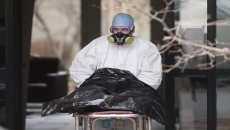A survey from the Angus Reid Institute suggests that the pandemic has changed the way most Canadians think about their future with long-term care.
The survey finds that just 18 per cent of respondents say their views haven't changed since COVID-19 hit, but about half of those surveyed say they now "dread" the thought of themselves or their loved ones being in long-term care.
Long-term care residents have accounted for the majority of COVID-19 deaths in Canada.
The report says that both those with loved ones in care and those without are equally likely to have changed their views. On other questions throughout the survey, such as what should change within the system, the two groups of people often held similar views.
That doesn't always happen, said president Shachi Kurl.
Some beeeeeg findings in this study. New from us at @angusreidorg today. https://t.co/mSAHXsOZxg
— Shachi Kurl (@ShachiKurl) July 26, 2021
"Often lived experience can lead to a very different outlook on an issue as opposed to those who have an opinion on an issue but don’t have the lived experience," she said.
"In this case on many fronts, there’s a significant amount of alignment and consistency between those who have spent the last year or so dealing with the day in day out of having a loved one in a long-term care facility and those who have simply been observing, reading about, hearing about it...That’s probably a pretty critical marker for policymakers."
She noted that a previous Angus Reid survey on long-term care found that even though some people with family in a facility felt their loved one had been failed, there were significant numbers who felt that their facility did everything it could under the circumstances.
"What came out, what captured the attention of people across the country, were those stories of failure," she said.
"It’s the issue that horrified and galvanized Canadians as they heard about it."
Three-quarters of respondents said significant changes, if not a complete overhaul, should happen in long-term care, though responses were divided on how people prioritized areas of need. The top option was having more inspections and enforcement of standards.
More than half of those surveyed - 55 per cent - said they would be willing to pay an increase of two per cent in their tax rate to fund improvements to long-term care. The most support for that idea came from British Columbia, where 60 per cent of respondents agreed with that idea, and in Ontario, it was 59 per cent.
"One of the chronic challenges in addressing systems that need changing or need improvement in this country is often that Canadians have an appetite to see those improvements, but they’re not…as willing to dip into their own wallets to fund them," Kurl said.
"I do think the fact that you have more than half…saying, 'Yeah, I personally would pay more to see improvements and those improvements could be anything from hiring more staff in such facilities or paying workers more or investing more in enforcement,' you see that healthy appetite."
Three-quarters of respondents also said they would support making long-term care a fully integrated part of the public health system, and 40 per cent said private companies should be phased out of operating long-term care homes. A majority also agreed that Canada should invest in-home care.
The self-commissioned online survey was conducted from March 15 to 18, among a representative randomized sample of 1,503 Canadian adults who are members of Angus Reid Forum.
The polling industry's professional body, the Canadian Research Insights Council, says online surveys cannot be assigned a margin of error because they do not randomly sample the population.






